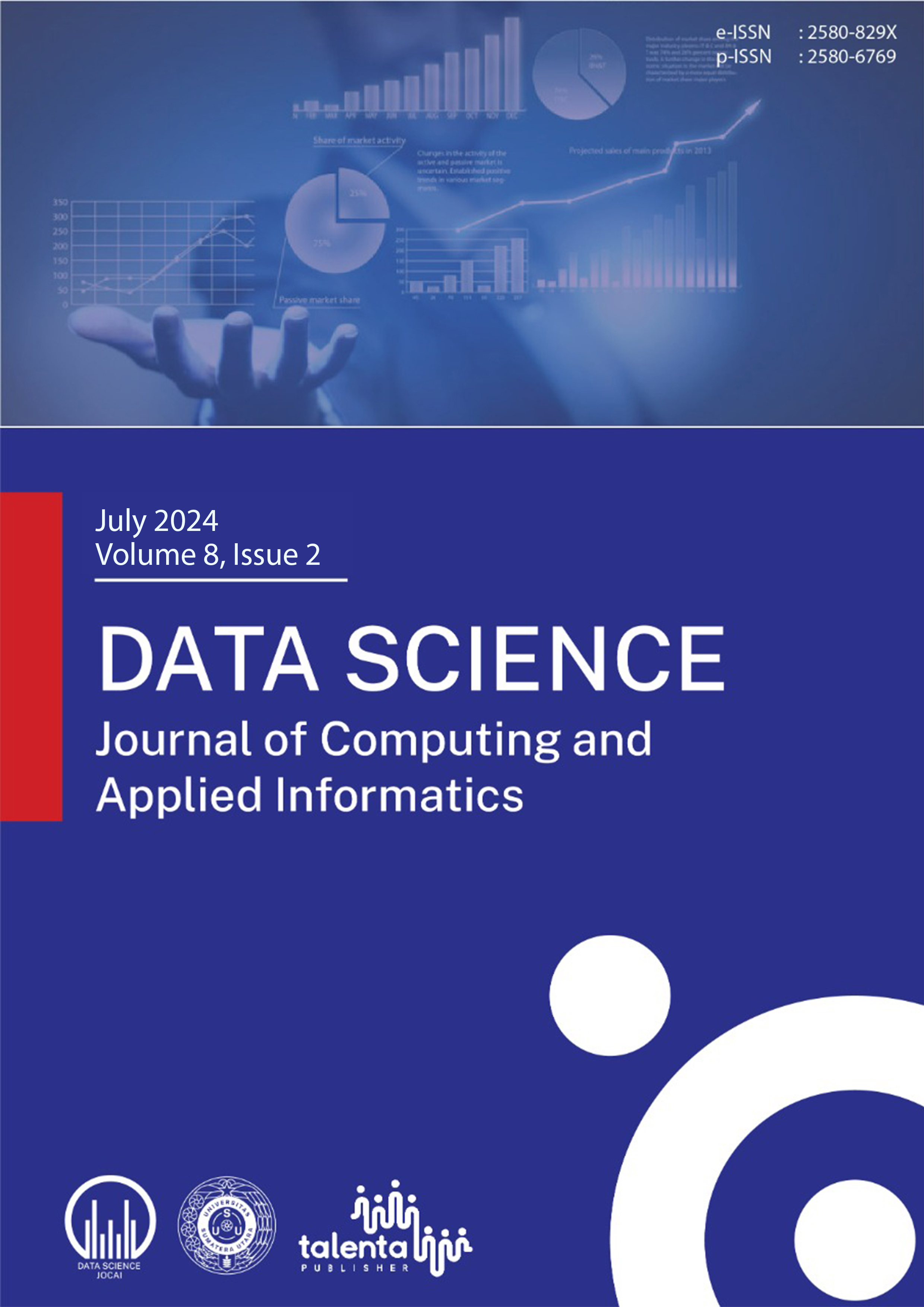Deciphering the Key Drivers of Sustainability : Harnessing Artificial Intelligence in Data Analytics to Unravel the Dynamics of Decarbonisation in Pursuit of Sustainable Development
DOI:
https://doi.org/10.32734/jocai.v8.i2-15005Keywords:
Sustainable Development Goals (SDGs), Artificial Intelligence (AI), CO2 Emission Analysis, Data-Driven Sustainability, Socio-Economic FactorsAbstract
In the epoch where climate change poses an existential threat to humanity, understanding the intricate dynamics of CO2 emissions is more critical than ever. This study embarks on an ambitious journey to unravel the complex interplay of factors influencing carbon emissions, leveraging the prowess of Artificial Intelligence (AI) and the analytical capabilities of Power BI. Anchored in the context of the United Nations' Sustainable Development Goals (SDGs), this research transcends traditional analytical boundaries, offering a novel lens to view and interpret environmental data. At the heart of this exploration lies the UN SDG dataset, a rich tapestry of environmental, economic, and social indicators. The study's methodology is a fusion of advanced AI techniques with Power BI's visualization influencers, a combination that not only promises precision but also an unprecedented depth of insight. This dual approach enables a multifaceted analysis, capturing the nuances and subtleties often lost in conventional studies. The findings of this research are both revealing and transformative. They shed light on the significant yet varied factors that drive CO2 emissions across different geographical and socio-economic landscapes. The study unveils a striking correlation between increased access to electricity and GDP per capita with rising carbon emissions, a pattern particularly pronounced in developing regions. Conversely, in more developed contexts, the analysis reveals a complex interplay between emissions, literacy rates, and fertility rates, suggesting indirect yet potent pathways through which socio-economic development influences environmental outcomes. The insights gleaned offer a beacon for policymakers, illuminating the pathways to tailor environmental strategies that resonate with the unique needs of different regions. For developing nations, the study advocates for policies that intertwine educational and family planning initiatives with environmental objectives. In contrast, for developed countries, it underscores the need for technological innovation and efficiency improvements. The study's innovative use of AI and Power BI sets a new precedent in environmental research, demonstrating the immense potential of these tools in shaping sustainable futures.
Downloads
References
IPCC. (2021). Climate Change 2021: The Physical Science Basis. Intergovernmental Panel on Climate Change.
Smith, P., et al. (2019). "Interlinkages between CO2 Emissions and Socio-economic Factors." Environmental Research Letters.
United Nations. (2015). Sustainable Development Goals. United Nations.
Thompson, W. (2022). "Analyzing the UN’s Sustainable Development Goals at Gartner Data & Analytics Summit EMEA."
Patria, H. (2021a). The Role of Leadership and Decision-Making under Crisis: A bibliometric analysis and scientific evolution from 1962 to 2020. Asia-Pacific Management and Business Application.
Patria, H. (2021b). The Role of Success Rate, Discovery, Appraisal Spending, and Transitioning Region on Exploration Drilling of Oil and Gas in Indonesia in 2004–2015. Economics and Finance in Indonesia, 67(2), 196. https://dx.doi.org/10.47291/efi.v67i2.952.
Patria, H. (2022a). Predicting the Oil Investment Decision through Data Mining: Empirical Evidence in Indonesia Oil Exploration Sector. Data Science: Journal of Computing and Applied Informatics (JoCAI), 6(1), 1-11. https://doi.org/10.32734/jocai.v6.i1-7539.
Patria, H. (2022b). Predicting Fraudulence Transaction under Data Imbalance using Neural Network (Deep Learning). Data Science: Journal of Computing and Applied Informatics, 6(2), 67-80. https://doi.org/10.32734/jocai.v6.i2-8309.
Patria, H. (2023a). "BUSINESS INTELLIGENCE: Intelijen Bisnis Strategi dan Teknologi yang Digunakan oleh Perusahaan untuk Analisis Data Informasi Bisnis."
Patria, H. (2023b). Bayesian Regression for Predicting Price Empirical Evidence in American Real Estate. Data Science: Journal of Computing and Applied Informatics, 7(1). https://doi.org/10.32734/jocai.v7.i1-10082.
Patria, H. (2023c). The Price Prediction with Bayesian Inference and Visualization: Empirical Evidence in India Real Estate. Data Science: Journal of Computing and Applied Informatics, 7(2), 69-80. https://doi.org/10.32734/jocai.v7.i2-11434.
Kurniawan, A., Rifa'i, A., Nafis, M.A., Andriaswuri, N. S., Patria, H., & Purwitasari, D. (2022). Feature Selection and Sensitivity Analysis of Oversampling in Big and Highly Imbalanced Bank's Credit Data. 10th International Conference on Information and Communication Technology (ICoICT), pp. 35-40. https://doi.org/10.1109/ICoICT55009.2022.9914889.
Microsoft (2023). Learn Power Platform Power BI: Create key influencers visualizations https://learn.microsoft.com/en-us/power-bi/visuals/power-bi-visualization-influencers?tabs=powerbi-desktop
Sufi, F. K. (2021). AI-Landslide: Software for acquiring hidden insights from global landslide data using Artificial Intelligence. Software Impacts, 10, 100177.
Sufi, F. K. (2022a). AI-GlobalEvents: A Software for analyzing, identifying and explaining global events with Artificial Intelligence. Software Impacts, 11, 100218.
Sufi, F. (2022b). A decision support system for extracting artificial intelligence-driven insights from live twitter feeds on natural disasters. Decision Analytics Journal, 5, 100130.
Sufi, F. K., & Alsulami, M. (2021). Knowledge discovery of global landslides using automated machine learning algorithms. IEEE Access, 9, 131400-131419.
Downloads
Published
How to Cite
Issue
Section
License
Copyright (c) 2024 Data Science: Journal of Computing and Applied Informatics

This work is licensed under a Creative Commons Attribution-ShareAlike 4.0 International License.















